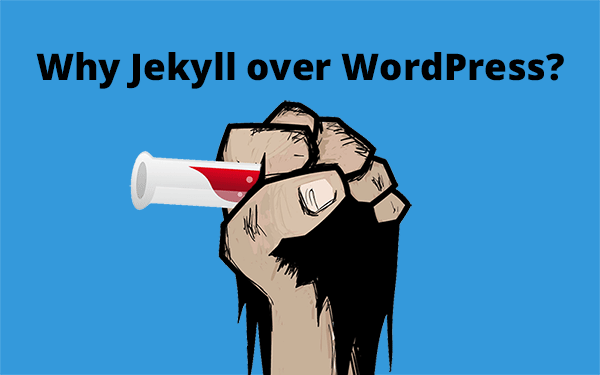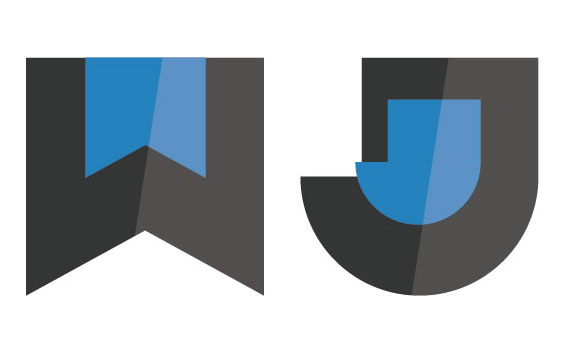A long time ago I had few blogs that were running on WordPress. I bought domain names and a reliable hosting space to keep them running. WordPress blogs are very easy to set up. There are thousands of themes and plugins for all kinds of looks and functionalities. I will discuss some of the major differences between Wordpress and Jekyll.
WordPress vs Jekyll
1. WordPress is Heavy!
WordPress is heavy. By saying heavy what I mean is that it has a lot of code in it. Even a minimal WordPress blog will have too much code. Take a minimal theme from WordPress and compare it with this theme Thunder or any Jekyll theme. You will observe a significant difference in size when you view source.
Using a lot of plugins can lead to this problem. WordPress bloggers don’t usually realize whether the website is slowed down by a plugin. The reason could be that they are using a faster internet connection. For them the website still loads quick but when it comes to a slower data connection, the real face(pace) of the website is revealed!
Google Chrome has a nice inspection option called Network Throttling where you can simulate a slow internet connection on your browser. Check your WordPress site with a 2G/3G connection.
- WordPress vs Jekyll
- Jekyll vs Wordpress
- Start here
- Use a theme that suits your needs
- Understand baseurl
- Understand Jekyll file structure
- Write more posts
- Use a custom domain name for your blog
- Create a contact form for your Jekyll blog
- Create a subscribe form for your Jekyll blog
- Make your blog super fast!
- Optimize Jekyll blog for SEO
- Secure your Jekyll blog with https
- Conclusion
2. WordPress is Slow
This is the by-product of being heavy. More the code slower the website. WordPress has some frameworks that makes it light and fast but doesn’t come anywhere close to Jekyll’s simplicity.
3. WordPress is Unsecure
Wordpress is prone to number of hacks. You should keep the WordPress base, themes and plugins up to date to make sure there is no vulnerability that can be exploited. Since it uses database, there is always a chance that someone can find a loophole and exploit the site.
Most hackers use Brute-Force or SQL Injections to take control over the website. This isn’t possible in case of Jekyll.
4. Difficulty to write Posts on WordPress
If you have written posts on WordPress then you know what I’m talking about. It almost always is online. There are offline apps to write blogs but then you will have to test it online. It is not a big deal. Actually, WordPress has image drag and drop option which is so much easier than Jekyll. But Jekyll stands out because of its Markdown support by default.
Markdown is addictive!
5. WordPress Hosting is Expensive
WordPress needs a hosting which supports php and mySQL. So, it is comparatively costly to host. Jekyll being static can be hosted for cheap on static file hosting providers or for free on Github!
Read: How to create a Jekyll blog
I have also made a video on how you can host any html template using Github Pages in around 5 minutes - Free & Easy webhosting
This might surprise many people because they always think that they have to pay for hosting.
6. WordPress Poses many Design Restrictions
This is actually the key reason to migrate from WordPress. WordPress has a lot of themes and plugins to choose from but if you want to change something, say you want the logo to be some pixels down then it becomes a hassle.
I have discarded many themes in WordPress for not being customizable. Most of the free themes come with a foooter with links to the theme designer. We can remove it in the code but once you update the theme, it will start showing up again.
7. Distractions
If you have ever visited a WordPress site (I bet you’ve) you will see something like this happening.

Since WordPress is easy to use and there are gazillion plugins available to emulate these kind of pop-ups, top-bars and other ridiculous bars. Many people use these features as they like, screwing up their readers experience.
May be it is ok with most users but when I see a pop-up I will look for the close button before reading anything on it.
Do not interrupt your readers.
The worst thing you can do to someone who’s reading your blog is to distract them. Let them read the damn thing. They may have googled something, found your website link, clicked on it for help. You should be lucky that they landed on your website because there at least 10 different websites offering the same content. If they like what you write then they definitely will subscribe.
These days with all those spam emails cluttering my inbox, I don’t like to give up my email address to anyone. Last time I was reading Oliver Emberton’s blog and it was a nice experience. Though the website is made using WordPress, it wasn’t distracting at all. It was rather intriguing. I ended up subscribing to his blog without any such intervensions.
Jekyll vs Wordpress
1. Jekyll is Simple
Jekyll has no database! Jekyll runs nothing on the server. It just keeps files ready to be served. Jekyll is really simple once you understand the basic structure and functions. It supports markdown for posts and pages. It uses the famous Liquid Syntax by shopify for conditional logic and other functionalities which is basically human readable coding! I think this way of coding is very comprehensive even to a non-coder.
2. Jekyll is Light, Fast and Secure
Since Jekyll has very less code, it is fast by default. If you want to see the difference, then take a Jekyll site (take this site for example) and a WordPress site and compare them on PageSpeed Insights.
Having no database is kind of good when we are looking at security. Static sites are way more secure than Dynamic ones. Static sites are almost unhackable.
3. You are in control!
You are responsible for even a single extra space added to the code! So you have the complete control of the website or blog. This also means that you can easily minify, compress all the assets as you like.
4. Jekyll uses Markdown for Posts and Pages
I just love to write in markdown. Markdown allows you to write your post even in a text editor. It has helped me in a big way. Let’s say we are travelling and got an idea for an article. We can literally start writing the post right away on our smartphone using any note taking app!
I always have a local copy of my blogs.
Eventually, I switched all my blogs to Jekyll and I always have a local copy of my blog which wasn’t easy to have in WordPress. I’m pretty happy with the performance of my blogs. For example, my chess blog kidschessworld is built using Jekyll and hosted on Github Pages which has helped me gain some business(I teach chess online).
You don’t have to worry about the design part. There are hundreds of themes already available. You can subscribe to my blog to get a detailed list of free responsive Jekyll themes and their links to start off with.
Start here
Usually, Jekyll is hosted on github pages but you can also host it on any other conventional hosting service. But one thing you observe is that, almost all the Jekyll themes are hosted on a github repository. So in order to test it out you should know how to fork(copy) the repo to your own account. And to do that, you should have a github account. So sign up for a free account.
Once that is done, you have to find a nice theme for your blog. So do some research or sign up here to get a quick checklist. You can also checkout Jekyll Themes. Now you should visit the theme’s homepage. Here is a video guide.
Use a theme that suits your needs
Jekyll has a pretty large community now. There are people creating awesome themes. I suggest going through Jekyll Themes or my Theme section and find the one that suits your needs.
Understand baseurl
Now you have the theme file hosted on some URL. You can make changes to this by editing most of the files in the repository. But you should be careful while editing _config.yml. Many beginners edit the baseurl: to something and get 404 error!
To avoid this, you should understand why is it used. Baseurl is the base of your repository where the files are located. If your repository name is jekyll-blog then your baseurl is /jekyll-blog.
Understand Jekyll file structure
If you observe the forked repository, it will have some folders with names starting with an underscore. These folders are meant for certain things. For example _posts is where all the posts should reside.
Read Layman’s Guide to Jekyll for a good insight.
Write more posts
Jekyll offers markdown support. So you can edit your blog posts in markdown and Jekyll will convert it into html. You can use prose.io to write your posts on the go, even from a smartphone. Read How to edit or add Jekyll posts through Browser using Prose.
Use a custom domain name for your blog
Your blog may be hosted with a URL http://username.github.io which is a third party domain. If you want to use your own domain name then read How to add a custom domain name to Jekyll blog. Though the procedure is for github pages, the same thing applies to Jekyll blog.
Create a contact form for your Jekyll blog
Beginners try php forms inside Jekyll and see that it doesn’t work. It doesn’t because Jekyll doesn’t execute code on the server. So restrain yourself from using php. Since Jekyll blog is a static site, you should use something that works on a static website. Read How to create a contact form in Jekyll.
Create a subscribe form for your Jekyll blog
Maintaining a mailing list is good for initial traffic. Mailchimp forms can be used inside Jekyll. I hope even Aweber forms can be used in Jekyll (I haven’t tried Aweber). Read How to create a mailchimp subscribe form in Jekyll.
Make your blog super fast!
Faster websites keep users happy. Your blog is already fast because you are using Jekyll but you may have too many things loading up or have heavy media files. For a fast Jekyll blog read How to speed up Jekyll blog.
Optimize Jekyll blog for SEO
Now your blog is ready to rock. But let’s find some organic traffic. Read How to optimize Jekyll blog for SEO.
Secure your Jekyll blog with https
Using SSL on Jekyll blog will improve your search engine ranking! It also keeps users session safe. Read How to get SSL certificate for Jekyll.
Conclusion
There are 100 other things you can do using Jekyll but for a beginner, the above tasks are enough to start off with. I don’t think I will ever go back to WordPress. But I still suggest WordPress for non-technical people who do not want to touch a single line of code. Try Jekyll at least for fun and let me know how you felt.
I may have missed several points on WordPress and Jekyll regarding their advantages, disadvantages, user-friendliness etc. Let me know what is missing so that I can add to the list.
Thanks for reading!









